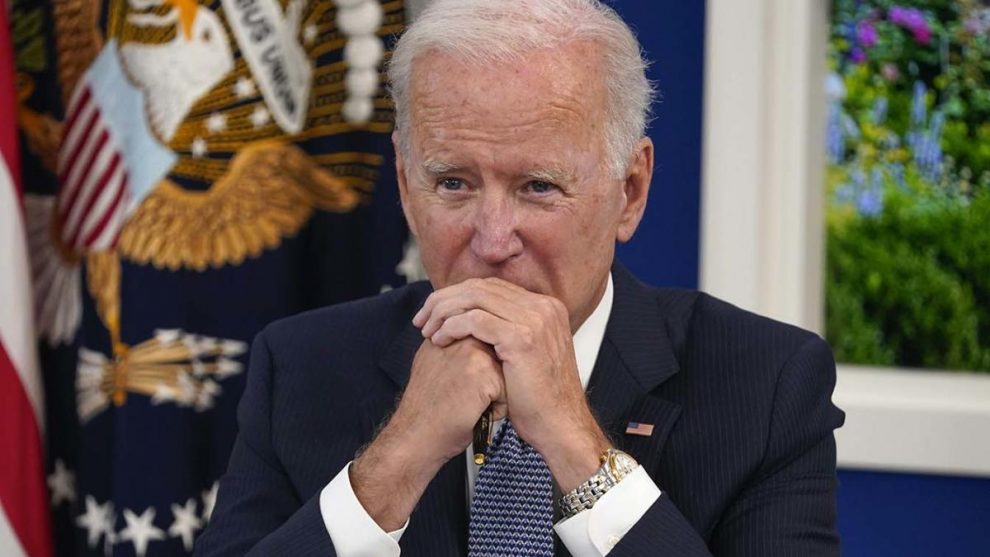President Biden’s agenda remains popular with the American people, according to a new Yahoo News/YouGov poll. But approval of the president himself has fallen to a new low as Democrats struggle to get his plans through a gridlocked Congress.
The survey of 1,640 U.S. adults, which was conducted from Oct. 1 to Oct. 4, found that Biden’s approval rating has slipped another 3 points since mid-September, to 42 percent — his lowest yet. Meanwhile, half of Americans (50 percent) continue to disapprove of how the president is handling his job.
Yahoo News and YouGov polled immediately after Democratic moderates and progressives failed to agree last week on the size and scope of Biden’s signature Build Back Better proposal, which would invest trillions of dollars in so-called human infrastructure, such as childcare, education and combating climate change. As a result, House Speaker Nancy Pelosi was forced to cancel a planned vote on a related $1.2 trillion bipartisan package to fund improvements in physical infrastructure; progressives are insisting that Congress pass the two bills in tandem.
Perhaps in part reflecting the current impasse on Capitol Hill, fewer Americans now say that “things are headed in the right direction” (28 percent) than at any previous point during Biden’s presidency. Just 37 percent approve of how Biden is “dealing with Congress.” And even fewer Americans (26 percent) now express confidence in Congress itself, down 11 points since September 2020.
Yet the poll also shows that most Americans favor the actual bills in question — which suggests that passing them could help revive Biden’s public standing. Nearly 6 in 10 (59 percent) support the smaller bipartisan infrastructure plan that Senate Democrats and Republicans recently passed to rebuild roads, bridges and other traditional infrastructure at a cost of $1.2 trillion. Just 17 percent oppose it. That represents a net improvement of 16 percentage points since August (when 50 percent favored the plan and 24 percent opposed it).
At first glance, Biden’s larger Build Back Better proposal seems less popular. Described as a “$3.5 trillion plan that would do more to address climate change while also supporting working families with childcare subsidies, national paid family leave and universal pre-K,” it garners more support (48 percent) than opposition (32 percent), but falls just short of a majority.
In reality, however, Congress will not vote on a $3.5 trillion version of Build Back Better; centrist Democratic Sens. Joe Manchin of West Virginia and Kyrsten Sinema of Arizona rejected that initial price tag, and lawmakers are now negotiating toward a smaller bill that can secure the support of all 50 Senate Democrats (which is necessary to avoid a filibuster and pass legislation on a simple majority vote through a process called budget reconciliation).
As it turns out, most Americans do support the sort of bill that is likely to emerge from these negotiations. Asked whether they would “favor or oppose the plan to do more to address climate change while also supporting working families if it were more limited in scope and cost $2 trillion or less” — a target floated by Biden himself — 7 percent of those who opposed the $3.5 trillion proposal changed their minds. Together with the 48 percent who already support the larger proposal, this means about 55 percent of Americans now say they would favor a scaled-down version of the Build Back Better plan. Just 26 percent say they would oppose it.
That support may even increase once Democrats decide on the final components of the legislation. Polled individually, the actual policies that make up Build Back Better garner strong support. Three-quarters of Americans, for instance, favor “extending Medicare coverage to include dental, vision and hearing”; just 11 percent are opposed. Nearly as many (73 percent) favor “increasing funding for in-home care of older Americans and those with disabilities.”
At the same time, around 6 in 10 favor “building affordable and energy-efficient housing units” (65 percent); “offering paid family leave to new parents just before and after a child’s birth” (62 percent); “expanding subsidies for low- and middle-income Americans to buy health insurance” (59 percent); “investing in clean energy to reduce carbon emissions and combat climate change” (59 percent); “creating subsidies that would reduce the cost of childcare for working parents” (58 percent); and “providing universal pre-K for all American children” (57 percent). Less than a quarter of Americans oppose any of these policies.
Why are specific aspects of Biden’s agenda even more popular than the overall plan? The Yahoo News/YouGov poll suggests that simple inattention could be one cause. Nearly a quarter of Americans (24 percent) still have no opinion about which of the plans Congress should pass, while the rest are divided. Just over a third (35 percent) say Congress should pass both plans; slightly less favor passing just the smaller bipartisan package (17 percent) or neither (13 percent). Likewise, fewer than 1 in 4 Americans (22 percent) say they are following news about “the budget and infrastructure debate in the U.S. Congress” very closely.
If many Americans are tuning out details of the infrastructure debate, they seem even more hazy about raising the debt limit — a routine process that allows the U.S. government to pay for what it has already spent and owes to creditors that’s being filibustered by Republicans (with potentially dire economic consequences).
Yahoo News and YouGov asked about increasing the federal borrowing cap in two ways, administered to random halves of the sample. When asked about simply raising the debt limit, 32 percent of Americans were in favor and 36 percent were opposed. But adding some context — that “to avoid defaulting on America’s past debts, and to continue paying Social Security benefits and military salaries without sparking a possible recession, Congress must soon raise the debt limit just as bipartisan majorities have routinely done for the last century” — produced nearly 2-to-1 support: 44 percent in favor, 23 percent opposed.
In both instances, however, 32 percent of respondents were unsure how to answer. The uncertainty and malleability of opinion implies that most Americans are unfamiliar with the debt ceiling — and few hold strong existing opinions on what to do about it.
Ultimately, more Americans blame Republicans (60 percent), progressive Democrats (59 percent) or moderate Democrats (58 percent) for the current gridlock over spending in Congress than blame Biden himself (49 percent). When asked who deserves the most blame, more Americans say Republicans (32 percent) or progressive Democrats (23 percent) than Biden (13 percent) or moderate Democrats (5 percent).
Still, this is likely Biden’s last best chance to enact the bulk of his agenda before the 2022 midterms. If Democrats fail to get such popular plans through a Congress they control, it’s hard to see how they — or the president — will be better off.
Story cited here.
























